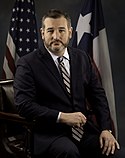Ted Cruz Quote
Just a few months into my tenure in the Senate, the Senate Judiciary Committee convened a hearing on Feinstein’s renewed assault weapons ban, which included a hundred-page list of prohibited and permitted firearms. Sitting on the far side of the panel as the committee’s second most junior Republican, I noted that the operative language of the Second Amendment—the right of the people to keep and bear arms shall not be infringed—is the same as the operative language in the First Amendment and the Fourth Amendment, which protect the right of the people peaceably to assemble and the right of the people to be secure in their persons, houses, papers, and effects, against unreasonable searches and seizures. I then asked a simple question of Senator Feinstein: Would she deem it consistent with the Bill of Rights for Congress to engage in the same endeavor that we are contemplating doing with the Second Amendment in the context of the First or Fourth Amendment? Namely, would she consider it constitutional for Congress to specify that the First Amendment shall apply only to the following books and shall not apply to the books that Congress has deemed outside the protection of the Bill of Rights? Likewise, would she think that the Fourth Amendment’s protection against searches and seizures could properly apply only to the following specified individuals and not to the individuals that Congress has deemed outside the protection of the Bill of Rights?
Just a few months into my tenure in the Senate, the Senate Judiciary Committee convened a hearing on Feinstein’s renewed assault weapons ban, which included a hundred-page list of prohibited and permitted firearms. Sitting on the far side of the panel as the committee’s second most junior Republican, I noted that the operative language of the Second Amendment—the right of the people to keep and bear arms shall not be infringed—is the same as the operative language in the First Amendment and the Fourth Amendment, which protect the right of the people peaceably to assemble and the right of the people to be secure in their persons, houses, papers, and effects, against unreasonable searches and seizures. I then asked a simple question of Senator Feinstein: Would she deem it consistent with the Bill of Rights for Congress to engage in the same endeavor that we are contemplating doing with the Second Amendment in the context of the First or Fourth Amendment? Namely, would she consider it constitutional for Congress to specify that the First Amendment shall apply only to the following books and shall not apply to the books that Congress has deemed outside the protection of the Bill of Rights? Likewise, would she think that the Fourth Amendment’s protection against searches and seizures could properly apply only to the following specified individuals and not to the individuals that Congress has deemed outside the protection of the Bill of Rights?
Related Quotes
About Ted Cruz
After graduating from Princeton University and Harvard Law School, Cruz pursued a career in politics, later working as a policy advisor in the George W. Bush administration. In 2003, Texas Attorney General Greg Abbott appointed Cruz to serve as Solicitor General, a position he held through 2008. In 2012, Cruz was elected to the U.S. Senate, becoming the first Hispanic-American to serve as a U.S. senator from Texas. In the Senate, he has taken consistently conservative positions on economic and social policy; he played a leading role in the 2013 United States federal government shutdown, seeking to force Congress and President Barack Obama to defund the Affordable Care Act. He was reelected in a close Senate race in 2018 against Democratic candidate Beto O'Rourke.
On March 23, 2015, Cruz announced he was running for president. Despite having only been a senator for two years, he emerged as a serious contender in the Republican primaries. The competition for the Republican presidential nomination between Cruz and front-runner Donald Trump was heated and characterized by a series of public personal attacks. After Trump won the nomination, Cruz initially declined to endorse him, but he became a staunch supporter of Trump during his presidency. After the January 2021 Capitol attack, Cruz received widespread political and popular backlash for objecting to the certification of Joe Biden's victory in the 2020 presidential election and giving credence to the false claim that the election was fraudulent.
Cruz is running for reelection to the Senate in 2024 against Democratic nominee Colin Allred and other third-party candidates.
